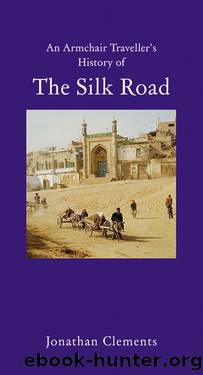A History of the Silk Road by Jonathan Clements

Author:Jonathan Clements [Clements, Jonathan]
Language: eng
Format: epub
Tags: Travel, General, Asia, Central, History, Central Asia
ISBN: 9781909961371
Google: UpIBMQAACAAJ
Publisher: Haus Publishing
Published: 2017-09-15T02:40:12+00:00
Yaqub Beg and Kashgaria
The Western Regions were renamed Huijiang, âthe Muslim Frontierâ, and then Xinjiang, âthe New Frontierâ in the 1880s. This shift in nomenclature reflects attitudes in China, which first regarded it as an area defined by a different ethnicity and religious belief, but later saw the potential for colonisation and exploitation. However, the 19th century saw a series of upstarts and rebels causing trouble in the region, often using Islam as an excuse, and leaning on support from beyond the borders in Central Asia, particularly from the Khanate of Kokand (1709â1876, a Muslim state centred on the Ferghana Valley).
They were never successful. Khoja Wali Khan, a distant descendant of Afaq Khoja, was a constant thorn in Chinaâs side through the 1840s and 1850s, attacked Kashgar on several occasions, and all but captured it in 1857, enjoying 77 days of murder and rape, and amassing a pile of skulls by the riverside. But even this legendary assault failed to take the cityâs fort, which held out until reinforcements chased Wali Khan away again. Nor did it win him any friends elsewhere, scandalising his former supporters when they discovered that he had sanctioned the execution of fellow Muslims. As with earlier conflicts among the people of Xinjiang, Wali Khanâs predations are often remembered as a fight against China, when local Muslims suffered just as much, if not more, at his hands.
Wali Khan would try to involve himself in unrest once more in the 1860s, but would die in suspicious circumstances, seemingly at the order of a figure even more ruthless than him. Yaqub Beg (1820â77) was an adventurer from Kokand, who led an army into China in 1867, deposing the last of the White Mountain khojas and declaring himself an emir, at first as a vassal of his homeland, but soon afterwards as an independent ruler.
His short-lived state, sometimes referred to as Kashgaria, was also tied up with internal conflicts in Islam. He marched as far as Urumqi on a jihad, but it was a war against fellow Muslims; Yaqubâs army notably contained Chinese soldiers, fighting alongside the Muslims of his own sect. Hoping to conquer the Ili region north of the Tianshan range, he fought several battles against the local inhabitants, pushing large numbers of Kazakh and Kyrgyz tribesmen into Russia.
With Xinjiang now in his hands as far west as Hami, Yaqub imposed a harsh version of Sharia law that soon proved unpopular with his new subjects. The Uyghurs, it turned out, had been rather liberal in their adherence to the Islamic faith, and Yaqubâs enforcers were scandalised to discover women without veils in Urumqi, men without turbans, and pork and wine on sale in the marketplaces. Floggings were meted out to the offending parties, and Yaqub made a great and pious display of donations to the mosques in the region, all the while using money taken from the people through heavier taxes.
The same monetary issues that had irked both the Han Dynasty and Tang Dynasty had not much changed over the centuries.
Download
This site does not store any files on its server. We only index and link to content provided by other sites. Please contact the content providers to delete copyright contents if any and email us, we'll remove relevant links or contents immediately.
China Rich Girlfriend by Kwan Kevin(3902)
The Silk Roads by Peter Frankopan(3775)
Annapurna by Maurice Herzog(2846)
Hot Thai Kitchen by Pailin Chongchitnant(2815)
Full Circle by Michael Palin(2780)
Okonomiyaki: Japanese Comfort Food by Saito Yoshio(2391)
City of Djinns: a year in Delhi by William Dalrymple(2139)
The Ogre by Doug Scott(2119)
Photographic Guide to the Birds of Indonesia by Strange Morten;(2091)
Tokyo by Rob Goss(2022)
Vietnam, Cambodia, Laos & Northern Thailand by Lonely Planet(2016)
Tokyo Geek's Guide: Manga, Anime, Gaming, Cosplay, Toys, Idols & More - The Ultimate Guide to Japan's Otaku Culture by Simone Gianni(1949)
Discover China Travel Guide by Lonely Planet(1868)
Everest the Cruel Way by Joe Tasker(1829)
China (Lonely Planet, 11th Edition)(1800)
Lonely Planet China(1758)
China Travel Guide by Lonely Planet(1741)
Top 10 Dubai and Abu Dhabi by DK Travel(1719)
Iranian Rappers And Persian Porn by Maslin Jamie(1713)
